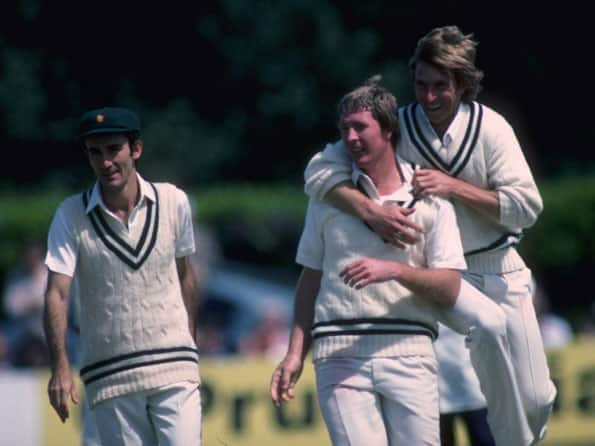
Cricket Country Staff
Editorial team of CricketCountry.
Australia vs Zimbabwe, Prudential World Cup, Trent Bridge Nottingham, June 9 1983
Zimbabwe won by 13 runs
Zimbabwe earned the right to play the World Cup after coming through the qualifiers -beating Bermuda in the ICC Trophy final in 1982.
Written by Cricket Country Staff
Published: Feb 26, 2011, 04:51 PM (IST)
Edited: Feb 26, 2011, 04:51 PM (IST)


Pitted against the minnows were Australia – strong contenders to win the World Cup and powered by a four-pronged pace attack – Geoff Lawson, Rodney Hogg, Dennis Lillee and Jeff Thompson.
Australia vs Zimbabwe, Prudential World Cup, Trent Bridge Nottingham, June 9 1983
Zimbabwe won by 13 runs
Zimbabwe earned the right to play the World Cup after coming through the qualifiers -beating Bermuda in the ICC Trophy final in 1982. Pitted against the minnows were Australia – strong contenders to win the World Cup and powered by a four-pronged pace attack – Geoff Lawson, Rodney Hogg, Dennis Lillee and Jeff Thompson.
But what unfolded at Trent Bridge was truly amazing, as Zimbabwe scripted one of the truly memorable upsets in World Cup history.
That Zimbabwe was going to treat the ball rather reputations with respect was evident from the positive intent of the Zimbabwean openers, Ali Shah and Grant Paterson.
Shah and Paterson batted in a manner that hardly indicated that they were greenhorns in international cricket.
The opening stand was oozing promise of developing into something significant, but Lillee neutralised the advantage, sending back both Paterson and Shah with the score on 55.
Lillee’s double strike saw Zimbabwe lose their way as they limped to 94 for 5.
Kevin Curran gave the much-needed support to skipper Duncan Fletcher – the man who in the years ahead became the first foreigner and non-Test player to coach England – as the two gave Zimbabwe the required momentum. The duo milked the Australian bowling and added 70 for the sixth wicket before Curran was packed off by Hogg.
Fletcher, however, found a solid ally in Iain Butchart. The two blended aggression and caution to raise 75 runs for the unconquered seventh wicket – Fletcher remaining unbeaten with 69.
But the Australians played a huge contributory role in facilitating Zimbabwe’s escape route. The Aussies muffed up as many as five catches to allow Zimbabwe get out of jail from a precarious 94 for 5 to a respectable 239 for 6.
Kepler Wessels and Graeme Wood, two of six left-handers in the top seven of the Aussie batting department, kick-started Australia’s response with a 61-run stand for the first wicket, which provided them the springboard for the robust batting line-up to follow.
But Duncan Fletcher came yet again to Zimbabwe’s rescue, having Wood caught behind.
Two runs later, Fletcher got rid of skipper Kim Hughes for duck. Fletcher took on the Aussies in a single-handed combat, dismissing David Hookes and Graham Yallop as well.
When Wessels (76) was run out at 138, an upset looked very much on the cards as Australia had lost half their side with still over a hundred needed for victory.
Wicketkeeper Rodney Marsh kept Australia going after the exit of Wessels with a strokeful half-century, but his effort was futile as Australia fell 13 runs short of the target.
Fletcher (69 and 4 for 44) was the unquestionable hero for Zimbabwe and was expectedly named “Player of the match”.
A fine example of “leading from the front”.
Pictures © Getty Images
This website uses cookies so that we can provide you with the best user experience possible. Cookie information is stored in your browser and performs functions such as recognising you when you return to our website and helping our team to understand which sections of the website you find most interesting and useful.
Strictly Necessary Cookie should be enabled at all times so that we can save your preferences for cookie settings.
If you disable this cookie, we will not be able to save your preferences. This means that every time you visit this website you will need to enable or disable cookies again.
